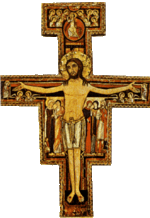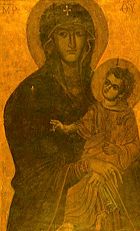Pope Innocent VIII
| Innocent VIII | |
| Papacy began | August 29, 1484 |
|---|---|
| Papacy ended | July 25, 1492 |
| Predecessor | Sixtus IV |
| Successor | Alexander VI |
| Birth name | Giovanni Battista Cybo or Cibo |
| Born | 1432 Genoa, Italy |
| Died | July 25, 1492 Rome, Italy |
| Other popes named Innocent | |

Pope Innocent VIII (1432 – July 25, 1492), born Giovanni Battista Cybo (or Cibo), was Pope from 1484 until his death.
Biography
Giovanni Battista Cybo (or Cibo) was born at Genoa of Greek extraction,[1][2][3] the son of Arano Cybo or Cibo (c. 1375-c. 1455) who under Pope Calixtus III (1455–58) had been a senator at Rome, and wife Teodorina de Mari (c. 1380-), and paternal grandson of Maurizio Cybo or Cibo and wife Saeacina Marocelli. His early years were spent at the Neapolitan court, and subsequently he went to Padua and Rome for his education. In Rome he became a priest in the retinue of cardinal Calandnini, half-brother to Pope Nicholas V (1447–55); the influence of his friends procured for him, from Pope Paul II (1464–71) the bishopric of Savona, and in 1473, with the support of Giuliano Della Rovere, later Pope Julius II, he was made cardinal by Pope Sixtus IV (1471–84), whom he succeeded on August 29, 1484 as Pope Innocent VIII.
The conclave was riven with faction, while gangs rioted in the streets. Cardinal Giuliano did not have sufficient votes at the conclave to be elected, so he turned his energies towards the election of Cybo, whom he was confident that he could control.
Shortly after his coronation Innocent VIII addressed a fruitless summons to Christendom to unite in a crusade against the infidels; the amount of his own zeal may in some degree be estimated from the fact that in 1489, in consideration of a yearly stipend of 40,000 ducats and a gift of the Holy Lance, he consented to favour Bayazid II (1481–1512) by detaining the Sultan's fugitive brother Cem in close confinement in the Vatican.
Innocent VIII, in his papal bull Summis desiderantes (5 December, 1484) instigated severe measures against magicians and witches in Germany. In 1487, he confirmed Tomas de Torquemada as grand inquisitor of Spain; he was a strong supporter of the Spanish Inquisition; he also urged a crusade against the Waldensians, offering plenary indulgence to all who should engage in it. In 1486, he prohibited, on pain of severe ecclesiastical censures, the reading of the nine hundred propositions of Pico Mirandola.
In Rome he built for summer use the Belvedere of the Vatican, on an unarticulated slope above the Vatican Palace, which his successor would turn into the Cortile del Belvedere. in season he hunted at Castello della Magliana, which he enlarged. Invariably short of money, he institutionalized simony at the papal court, creating new titles of offices that were discreetly auctioned.
In 1489, Ferdinand I of Naples having repeatedly refused to pay the tariff for his investiture, and a shaky peace of 1486 having failed, Innocent found reason to excommunicate Ferdinand and invite Charles VIII of France to come to Italy with an army and take possession of the Kingdom of Naples.The conflict was not ended until 1494, after Innocent's death.
An important event that coincided with his pontificate was the fall of Granada in January 1492, which was celebrated in the Vatican with great rejoicings. The Pope was sent a hundred fine Moorish slaves, whom he distributed among the Curia and to friends, and granted Ferdinand II of Aragon the epithet "Catholic Majesty."
Innocent VIII died on July 25, 1492, leaving behind him numerous children, of whom only two were publicly acknowledged, the others presented in the usual way as nephews.[4] In 1487 he married his elder son Franceschetto Cybo (d. 1519) to Maddalena de' Medici (1473-1528), by whom he had issue, the natural daughter of Lorenzo de' Medici, who in return obtained the cardinal's hat for his thirteen-year-old son Giovanni, later Pope Leo X. His daughter Teodorina Cibo married Gerardo Usodimare and had female issue. Savonarola chastised him for his worldly ambitions. The unsympathetic Roman chronicler Stefano Infessura provides many lively details, among them the apparent attempt to revive Innocent VIII on his deathbed by blood transfusions from three young male children (who died as well in the process).[5]
References
- ↑ The Every Day Book of History and Chronology Embracing the Anniversaries of Memorable persons and events in every period and state of the world, from the creation to the present time, Joel Munsell, 1858 Appleton, University of Michigan, p.295
- ↑ The Chronicles of Enguerrand de Monstrelet, Enguerrand de Monstrelet, Bon Joseph Dacier, 1849 H.G. Bohn, Oxford University, p.458
- ↑ The history of the Christian church during the Middle Ages with a summary of the reformation, centuries XI to XVI, Philip Smith, 1885 Harper & bros, University of Michigan, p.219
- ↑ "towards whom his nepotism had been as lavish as it was shameless" (Encyclopaedia Britannica 1911).
- ↑ Discoveries in medicine: blood transfusion.
| Roman Catholic Church titles | ||
|---|---|---|
| Preceded by Sixtus IV |
Pope 1484–92 |
Succeeded by Alexander VI |
|
||||||||||||||||
|
|||||||||||||||||||||||||||||||||||||||||||||
|
|||||||||||||||||||||||||||||||||||||||||||||

